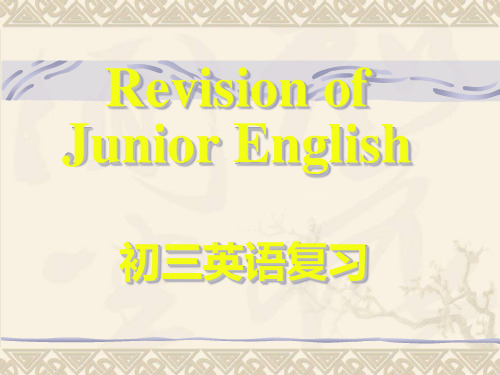初中英语语法课件完整版
合集下载
初中英语语法大全(详解)PPT 课件

5)几种比较级的使用句型 1.“ 比较级 + and + 比较级 ” 表示“ 越来越······”
*Your English is getting better and better. 你的英语越来越好了。 *These days more and more people are learning English. 现在学英语的人越来越多了。
她三十多岁了。 *The lightest weighs less than 50 kilograms. 最轻的不到五十公斤。
4.“more or less”表示“差不多,或 多或少”
*The problem is more or less solved.
这个问题差不多已经解决了。
*Is it straight? – More or less.
它直吗? – 差不多吧。
6)注意点
1. 形容词最高级前一定要用the,副词
最高级前可省略 2.在比较级中为了避免重复,在the后
常用one,that,those等词来替代前 面提到过的名词
*Thihe weather here is warmer than that of Shanghai.
2) 表示三者或三者以上(人或事物)的 比较用最高级,最高级的前面一般要加
定冠词the,后面可带of(in,among)
短语来说明比较的范围
*Shanghai is the biggest city in China.
*Lucy sings (the) best of all.
*He is the most careful among us.
4 He won’t do it. I won’t do it, __e_i_th__e_r___.
初中英语语法大全课件

(1)构成名词的后缀常用的有-ence,-(e)r/ -or (从事某事的人),-ese (某地人),-ess (雌性),-ful (一……),-ian (精通……的人),-ist (专业人员),-ment (性质;状态),-ness (性质;状态),-tion(动作;过程)等。例如: differ不同于→difference区别 write写→writer作家 Japan日本→Japanese日本人 act表演→actress女演员 mouth口→mouthful一口 music音乐→musician音乐家 racial种族的----racialist种族主义者
01
合成形容词
02
名词+形容词snow-white雪白的
03
名词+现在分词English-speaking讲英语的
04
名词+to+名词face-to-face面对面的
05
名词+过去分词man-made人造的
06
数词+名词one-way单行的
07
数词+名词+形容词two-year-old两岁的
动词转化为名词
很多动词可以转化为名词,大多意思没有多大的变化(如下①);有时意思有一定变化(如下②);有的与一个动词和不定冠词构成短语,表示一个动作(如下③)。例如:
Let's go out for a walk.我们到外面去散散步吧。
He is a man of strong build.他是一个体格健壮的汉子。
构成副词的常用后缀有-ly (主要用于形容词之后表示方式或程度),-ward(s) (主要用于表示方位的词之后表示方向)。
例如:
angry生气的→angrily生气地
to到→towards朝……,向……
(最新整理)初中英语语法专题课件完整版

Mary‘s book (mary的书) Marx’s theory(马克思的理论) 学生举例:丽丽的车 狗的尾巴(tail) (2)以s结尾的复数名词只加‘,不以s结尾的复数名词要加’s, the three girls‘ father 这三个女孩的父亲 the children‘s presents 孩子们的礼物 学生举例:双胞胎的房间 (3)表示几个人共有,仅在最后一个人的名字后加‘s;
表示各自所有时,需在各个名字后加‘s,如: Mary and Jane's car(她俩人共有的车) Mary's and Jane's cars(她俩各自的车) 学生举例:莉莉和露西的学校/丽丽的学校和露西的学校
(4)表示店铺、住宅、诊所、公共建筑等地点时,名词所有格后面的
名词习惯上省略。如:
the barber's=the barber's shop理发店
to my aunt‘s=to my aunt’s house到我姑姑家
The grocer’s(杂货店) The tailor’s(裁缝店)
学生举例:牙科诊所(dentist) 诊所
(5)有些指时间、距离、重量、价值、国家和城市等无生命的名词,
也可以加‘s构成所有格。如:
a week‘s time 一周的时间 The city’s parks(城市的花园)
child-children ox-oxen
3.复合名词的复数形式有两种
(1)中间有连字符或间隔的复合名词,将中心词变为复数,如:
sisterinlaw→sistersinlaw(嫂子)
boy classmate → →boy classmates
Passer-by →passers-by(路人)
表示各自所有时,需在各个名字后加‘s,如: Mary and Jane's car(她俩人共有的车) Mary's and Jane's cars(她俩各自的车) 学生举例:莉莉和露西的学校/丽丽的学校和露西的学校
(4)表示店铺、住宅、诊所、公共建筑等地点时,名词所有格后面的
名词习惯上省略。如:
the barber's=the barber's shop理发店
to my aunt‘s=to my aunt’s house到我姑姑家
The grocer’s(杂货店) The tailor’s(裁缝店)
学生举例:牙科诊所(dentist) 诊所
(5)有些指时间、距离、重量、价值、国家和城市等无生命的名词,
也可以加‘s构成所有格。如:
a week‘s time 一周的时间 The city’s parks(城市的花园)
child-children ox-oxen
3.复合名词的复数形式有两种
(1)中间有连字符或间隔的复合名词,将中心词变为复数,如:
sisterinlaw→sistersinlaw(嫂子)
boy classmate → →boy classmates
Passer-by →passers-by(路人)
初中英语语法大全课件

A comprehensive courseware on middle school Englis
目录
CONTENTS
• Noun • Article • Pronoun • Subjects and advertisements • Verb • Preparation • Connection • Sentence types
02
Article
The usage of define articles
Summary
This section covers the rules and examples of define article usage in English grammar
Index article usage in singular nouns
Personal pronouns
I
Used as the subject of a verb
You
used as the object of a verb or position
He/She
used as the subject or object of a verb or position
They
Use the index article "some" before Plural Nouns that are not countable, such as "bread" or "water" For countable regular nouns, use "a" or "an" depending on the noun's starting sound
目录
CONTENTS
• Noun • Article • Pronoun • Subjects and advertisements • Verb • Preparation • Connection • Sentence types
02
Article
The usage of define articles
Summary
This section covers the rules and examples of define article usage in English grammar
Index article usage in singular nouns
Personal pronouns
I
Used as the subject of a verb
You
used as the object of a verb or position
He/She
used as the subject or object of a verb or position
They
Use the index article "some" before Plural Nouns that are not countable, such as "bread" or "water" For countable regular nouns, use "a" or "an" depending on the noun's starting sound
初中英语语法课件ppt

vacation together.
过去将来时的使用:
一、过去将来时表示对于过去某一时间而言将要发生的动 作或存在的状态。 would或was /were going to + V
would可用于各种人称。
二、would +V还可表示过去的习惯动作,在这点上同used to同义。
When we were children, we would/used to go swimming every summer.
e) 用于条件从句“如果……想,设想”(接近if ……want to,或 if ……should) 例:Greater efforts to increase agricultural production must be made if food shortage ____________ avoided. A) is to be B) can be C) will be D) has been
一般现在时的动词形式: 动词原形 1.am;is ;are 2.have,has 3.第三人称单数形式-(e)s
肯定句:I watch television every day.
否定句:I don’t watch television every day.
疑问句:Do you watch television every day.
一般现在时的使用:
1.一般现在时表示总是、通常、习惯 性的动作或状态。
It snows in winter. I watch television every day.
2.用于对客观事实的普遍性的陈述。
Water consists of hydrogen and oxygen. Most animals kill only for food. The world is round.
过去将来时的使用:
一、过去将来时表示对于过去某一时间而言将要发生的动 作或存在的状态。 would或was /were going to + V
would可用于各种人称。
二、would +V还可表示过去的习惯动作,在这点上同used to同义。
When we were children, we would/used to go swimming every summer.
e) 用于条件从句“如果……想,设想”(接近if ……want to,或 if ……should) 例:Greater efforts to increase agricultural production must be made if food shortage ____________ avoided. A) is to be B) can be C) will be D) has been
一般现在时的动词形式: 动词原形 1.am;is ;are 2.have,has 3.第三人称单数形式-(e)s
肯定句:I watch television every day.
否定句:I don’t watch television every day.
疑问句:Do you watch television every day.
一般现在时的使用:
1.一般现在时表示总是、通常、习惯 性的动作或状态。
It snows in winter. I watch television every day.
2.用于对客观事实的普遍性的陈述。
Water consists of hydrogen and oxygen. Most animals kill only for food. The world is round.
初中英语语法课件

• 5. She __________ (not want) to stay in bed while the others ________________ (all, work) in the fields.
第二十页,共27页。
过去完成时
• 构成:
• had+动过去分词 • 多用于复合句中
• 用法:
• 3. He ________ very busy this week, he ________ free next week.
• A. will be; is B. is; is C. will be; will be D. is; will beave / has +PP
第四页,共27页。
• 练习题: • 1. We often__________(play) in the playgound. • 2. He _________(get) up at six o’clock.
• 3. __________you _________(brush) your teeth ev ery morning.
• 2. “_______ you _______ (write) a letter to your aunt yet?〞
• “Yes, I ___________. I ________________ (writ e) one last week.〞 、 3. “_________ he ____ (finish) his homework? 〞 “Not yet.〞 、 4. “_________ they ever __________ (be) abroad? 〞 “Yes, just once.〞 、 5. Your father _________ just ___________ (finish) his work.
第二十页,共27页。
过去完成时
• 构成:
• had+动过去分词 • 多用于复合句中
• 用法:
• 3. He ________ very busy this week, he ________ free next week.
• A. will be; is B. is; is C. will be; will be D. is; will beave / has +PP
第四页,共27页。
• 练习题: • 1. We often__________(play) in the playgound. • 2. He _________(get) up at six o’clock.
• 3. __________you _________(brush) your teeth ev ery morning.
• 2. “_______ you _______ (write) a letter to your aunt yet?〞
• “Yes, I ___________. I ________________ (writ e) one last week.〞 、 3. “_________ he ____ (finish) his homework? 〞 “Not yet.〞 、 4. “_________ they ever __________ (be) abroad? 〞 “Yes, just once.〞 、 5. Your father _________ just ___________ (finish) his work.
初中英语语法PPT精品课件

day .
• 练习题:
• 1. Li Ming said he _____happy if Brian_____to China ne xt month.
• A. as; come B. was; would come C. would be; came D.
will be; come
• 2. Jenny said she _____her holiday in China.
• 例句: • Are you going to read ? • He is coming tomorrow .
• 练习题:
• 1. There __________ a meeting tomorrow after noon. A. will be going to B. will going to be C. is going to be D. will go to be
• 2. Charlie ________ here next month.
• A. isn't working B. doesn't working C. isn't g oing to working D. won't work
• 3. He ________ very busy this week, he _____ ___ free next week.
• A. will be; is B. is; isБайду номын сангаасC. will be; will be D. is; will be
现在完成时
• 构成: • have / has +PP • have/has been+doing
• 用法: • 发生在过去影响在现在的动作或状态等
• 练习题:
• 1. Li Ming said he _____happy if Brian_____to China ne xt month.
• A. as; come B. was; would come C. would be; came D.
will be; come
• 2. Jenny said she _____her holiday in China.
• 例句: • Are you going to read ? • He is coming tomorrow .
• 练习题:
• 1. There __________ a meeting tomorrow after noon. A. will be going to B. will going to be C. is going to be D. will go to be
• 2. Charlie ________ here next month.
• A. isn't working B. doesn't working C. isn't g oing to working D. won't work
• 3. He ________ very busy this week, he _____ ___ free next week.
• A. will be; is B. is; isБайду номын сангаасC. will be; will be D. is; will be
现在完成时
• 构成: • have / has +PP • have/has been+doing
• 用法: • 发生在过去影响在现在的动作或状态等
初中英语语法大全精品PPT课件

多时,谓语用复数。 如:There is a sheep in the yard.(院子里有只绵羊)
There are some sheep in the yard.(院子里有一些绵羊) 4、maths, news等虽然有s结尾,但不是复数,因此谓语仍用单数: 如:The news is very exciting. (这个消息令人兴奋)
[注解]:
① ‘s还可以表示某人的家或者某个店铺, 如:my aunt’s(我阿姨家), the doctor’s(诊所)
② 两人共有某物时,可以采用 A and B’s 的形 如:Lucy and Lily’s bedroom(露西和丽丽合住的卧室)
Lucy’s and Lily’s bedroom(露西和丽丽分别的卧室)
如果表示整体概念,则谓语用单数形式, 如:Class Three is a very good class.(三班是好班) 如果表示其中的所有成员时,则谓语用复数形式, 如:Class Three have a map of China.(三班有张中国地图) 3、Chinese, Japanese, fish, sheep, people等表示单个时谓语用单数,表示许
如: box, child, orange;
不可数名词{u} 是不可以用简单的数词进行计数的名词。
如:water, news, oil, population, information .
英语可数名词的单复数
1、名词由单数变复数的基本方法如下: ①在单数名词词尾加s。 如:map → maps,boy→ boys,horse→ horses, table→ tables. ②s,o,x ,sh,ch结尾的词加es. 如:class→classes, box→boxes, hero→heroes, dish→dishes,
There are some sheep in the yard.(院子里有一些绵羊) 4、maths, news等虽然有s结尾,但不是复数,因此谓语仍用单数: 如:The news is very exciting. (这个消息令人兴奋)
[注解]:
① ‘s还可以表示某人的家或者某个店铺, 如:my aunt’s(我阿姨家), the doctor’s(诊所)
② 两人共有某物时,可以采用 A and B’s 的形 如:Lucy and Lily’s bedroom(露西和丽丽合住的卧室)
Lucy’s and Lily’s bedroom(露西和丽丽分别的卧室)
如果表示整体概念,则谓语用单数形式, 如:Class Three is a very good class.(三班是好班) 如果表示其中的所有成员时,则谓语用复数形式, 如:Class Three have a map of China.(三班有张中国地图) 3、Chinese, Japanese, fish, sheep, people等表示单个时谓语用单数,表示许
如: box, child, orange;
不可数名词{u} 是不可以用简单的数词进行计数的名词。
如:water, news, oil, population, information .
英语可数名词的单复数
1、名词由单数变复数的基本方法如下: ①在单数名词词尾加s。 如:map → maps,boy→ boys,horse→ horses, table→ tables. ②s,o,x ,sh,ch结尾的词加es. 如:class→classes, box→boxes, hero→heroes, dish→dishes,
初中英语语法专题课件完整版(共983张PPT)

2.不规则变化
构成方法
例词
形式不变 (单复数同形)
sheep-sheep deer-deer Chinese-Chinese Japanese-Japanese
变内部元音字母
foot-feet tooth-teeth goose-geese man-men mouse-mice
词尾加-en/-ren
a group of 一队,一组,一群
②还可用much,little,a little of,a large amount/deal of, no,plenty of等来修饰不可数名词,some,any既可修饰可数名词也可修 饰不可数名词。
much money,plenty of water a little of air some(肯定句): some milk ,some apples any(疑/否):Are there any stamps?I don’t have any money (5)数词-名词-形容词构成的复合形容词,中间的名词不能用
普通名词又可分为下面四类:
1)个体名词:表示单个人或单个事物。 如:gun、kid 、book。 2)集体名词:表示一群人或一些事物组成的集合体。 如:family。
3)物质名词:表示无法分为个体的物质、材料、食品、饮料、液体、气体、 金属等名称的名词,
如:pork、wood、bread、water、air。 4)抽象名词:表示动作、状态、品质、感情等抽象概念及学科、疾病。 如:work 。Hunger、honesty 、love、Chinese、success、HIV。 个体名词和集体名词可以用数目来计算,称为可数名词。
f,fe 为v,再加 -es
shelf-shelves thief-thieves
《初中英语语法》PPT课件

We know (that)we should learn from each other. Please tell me if/whether you have been to America. Could you please tell me where the restrooms are? 引导词是从句的一个成份,所以用哪个引导 词,看从句成份是 否完整,不完整,一定是特殊疑问句。完整,判断主句语气, 是疑问语气,用if/whether; 是肯定语气,用that.
2:用that, if/whether, how,where,what,….等连接词填 空.
that they will visit our school next week. 1.I hear_____
who the girl is? 2.Do you know_____ how can get to the park? 3.Could you tell me _____I 4.We thought ______you had never been there before . that 5.Please tell me_______ you live. where 6.Mother asked me ___________ I had finished my if/whether homework.
why 7.Do you know_____ she is angry? what 8.The teacher asked_____ your name was. how old
9.Tom is ten.I want to know _________ you whether are.
10.He asked you_______ you were a student or not.
初中英语语法大全免费ppt详解.

第7页,共74页。
规则变化
单音节词和少数双音节词
2) 以字母 e 结尾加 –r 或 –st
fine – finer – finest
late – later – latest nice – nicer – nicest
第8页,共74页。
规则变化 单音节词和少数双音节词
3) 重读闭音节、末尾只有一个辅音
(优选)初中英语语法大全免费 课件
第1页,共74页。
Adjectives
and Adverbs
形容词、副词
第2页,共74页。
区别几组易混淆的副词、形容词
★ already 常用于肯定句、个别疑问句 yet 常用于否定句、疑问句 * The train has already gone. * They haven’t come back yet.
a rest on Sunday. (hard)
2 __L_u_c_k__il_y__, he didn’t fail in the exam.(luck) 3 He was so _s_u_r_p_r_i_s_e_d_ that he couldn’t believe this _s_u_r_p_r_i_s_in__g news. (surprise)
= He is taller than the other students in his class.
= He is taller than any of the other students in his class.
= He is the tallest (student)in his class.
代词的分类
人称代词 Personal Pronouns 物主代词 Possessive Pronouns
规则变化
单音节词和少数双音节词
2) 以字母 e 结尾加 –r 或 –st
fine – finer – finest
late – later – latest nice – nicer – nicest
第8页,共74页。
规则变化 单音节词和少数双音节词
3) 重读闭音节、末尾只有一个辅音
(优选)初中英语语法大全免费 课件
第1页,共74页。
Adjectives
and Adverbs
形容词、副词
第2页,共74页。
区别几组易混淆的副词、形容词
★ already 常用于肯定句、个别疑问句 yet 常用于否定句、疑问句 * The train has already gone. * They haven’t come back yet.
a rest on Sunday. (hard)
2 __L_u_c_k__il_y__, he didn’t fail in the exam.(luck) 3 He was so _s_u_r_p_r_i_s_e_d_ that he couldn’t believe this _s_u_r_p_r_i_s_in__g news. (surprise)
= He is taller than the other students in his class.
= He is taller than any of the other students in his class.
= He is the tallest (student)in his class.
代词的分类
人称代词 Personal Pronouns 物主代词 Possessive Pronouns
初中英语语法大全-PPT

9.(2011·上海)These natural disasters have warned us that everyone should start to protect the ________immediately. A.amusement B.development C.environment D.government 【解析】本题考查名词词义辨析。amusement“娱乐”;development“发 展”;environment“环境”;government“政府”。句意为“这些自然 灾害已经告诫我们每个人应立刻开始保护环境。” 【答案】C
【答案】A
6.(2011·南京)—Mrs Black, could you give me some advice on how to write an application letter? —With pleasure.Remember that the letter should be written in the formal ________. A.value B.style C.effect D.mood 【解析】本题考查名词词义辨析。value“益处,价值”;style“风格, 文体”;effect“影响,效果”;mood“情绪,心情”。由语境知“写申 请信应用正式文体”。 【答案】B
10.(2011·黄冈)—Mrs.Wang was sent to teach English in a poor mountain village last year. —She said she would never forget some pleasant ________ while working there. A.experiments B.expressions C.experiences D.emotions 【解析】本题考查名词词义辨析。experiment“实验”;expression“表 达”;experience“经历”;emotion“感情”。空格所在句的句意为“ 她说她永远也不会忘记在那工作时的一些美好的经历。”故选C。 【答案】C
初中英语语法PPT课件

初中英语语法总结
初中语法分类
• 初中语法项目分类:(共8类) • 一般分类 • 1、一般现在时 • 2、一般过去时 • 3、一般将来时 • 4、现在进行时 • 5、现在完成(进行)时 • 6、过去进行时 • 7、过去完成时 • 8、过去将来时
一般现在时
• 构成: • 动词用原形 • 三人称单数-s / es
D. were; have for • 2. Could you tell me what time the plane ______? • A. left B. leaves C. leaved D. was leaving • 3. One of us ______band last month. • A. leaves B. leave C. leaved D. left
• 构成: • 动词用过去时 • Be—was/ were
• 用法: • 表过去某个、段时间内动作及状态
• 象征词: • ago/just now /In1998 last/yesterday 等
一般过去时
• 规则变化: • 一般/去e 双写/辅+y结尾-ied • 不规则变化: • go-went come-came • do-did leave-left等
过去将来时
• 构成: • would + V 原形 • 多用宾语从句中
• 用法: • 过去看来将要发生的动作或状态
• 象征词: • He said that he… the next day .
过去将来时
• 例句: • He said that he would come here the next
• 3. Jim __________ (jump) on the bus as it ____ ______ (move) away.
初中语法分类
• 初中语法项目分类:(共8类) • 一般分类 • 1、一般现在时 • 2、一般过去时 • 3、一般将来时 • 4、现在进行时 • 5、现在完成(进行)时 • 6、过去进行时 • 7、过去完成时 • 8、过去将来时
一般现在时
• 构成: • 动词用原形 • 三人称单数-s / es
D. were; have for • 2. Could you tell me what time the plane ______? • A. left B. leaves C. leaved D. was leaving • 3. One of us ______band last month. • A. leaves B. leave C. leaved D. left
• 构成: • 动词用过去时 • Be—was/ were
• 用法: • 表过去某个、段时间内动作及状态
• 象征词: • ago/just now /In1998 last/yesterday 等
一般过去时
• 规则变化: • 一般/去e 双写/辅+y结尾-ied • 不规则变化: • go-went come-came • do-did leave-left等
过去将来时
• 构成: • would + V 原形 • 多用宾语从句中
• 用法: • 过去看来将要发生的动作或状态
• 象征词: • He said that he… the next day .
过去将来时
• 例句: • He said that he would come here the next
• 3. Jim __________ (jump) on the bus as it ____ ______ (move) away.
